|
The AACP Newsletter |
||
| Since 1970 | Asian American Curriculum Project, Inc. - Books for All Ages | February 2004 |
| Newsletter Home Page | Event Schedule | AsianAmericanBooks.com | Editor's Notes | Featured Books |
|
Governmental Kidnapping? By Leonard Chan and Philip Chin Kidnap - to take (any one) by force or fear, and against one's will, with intent to carry to another place. Okay, did I catch your attention :)? Kidnapping may not be the correct word for what our government is doing and may even offend some of you, but I use it to draw your complete attention to the weight of the issues that are currently being debated in the courts and Congress. The debate is an old one that reaches back to the inception of our nation. Issues of security versus civil liberties and the balance of power are all coming to a head. We have been brought to this point by an executive branch that is bent on testing the limits of its powers. With the anniversary of executive order 9066 around the corner (Feb. 19, 1942), it is an appropriate occasion to remember a time when another president tested the limits of his office and to compare it with the events of today.
|
|
By Florence M. Hongo |
|
|
February, for each of us has many meanings. For many it is the thoughts of Valentine romance, chocolate candy, red roses and good wine, sharing love with family, friends and lovers. Skiing weekends. Chinese New Year's celebrations with parades, special foods and family gatherings.
For me, it is all those special events and more. It is also the "Day of Remembrance" for the infamous EXECUTIVE ORDER 9066 signed on February 19, 1942 by President Franklin D. Roosevelt. This ordered the removal of 120,000 people of Japanese ancestry from the West Coast. American born citizens and aliens alike were removed without due process. In February of 1942 when the Evacuation Orders went up on the electrical poles along the roads, I was thirteen year old and in the eighth grade in the California Central Valley town of Cressey. Our school was very small with a total of 75 students from first to eighth grade. Twin sisters taught 75 students divided into two classroom from first to fourth grade in one room and fifth to eighth in the other. As a thirteen year old, the great shock was not being able to graduate with my eight classmates with whom I had been together for eight years, learning, playing and becoming close friends. It was a time of incredible upheaval for our family of nine. Parents, three sons, and four daughters lived on a 60-acre farm carved from virgin soil in this farming community. Soon after, I came home from school to find a rectangular dust pattern where my piano used to be. My parents knowing how much I loved that piano had quickly made arrangements without telling me for "friends" to keep the piano until our return. There was no more space in the designated storage facility. When we returned some three and a half years later, the piano had been "stored" in a leaky shed and had hosted numerous generations of mice. The piano was in ruins, but we kept it for years hoping that it could be repaired. This was but one incident of the bad attitude of "friends" with whom we had entrusted farm equipment and, vehicles that we could not store or sell before evacuating. During the war, our family was removed to the Amache, Colorado concentration camp in the Southeast corner of Colorado, in the high desert country. When the call came out for volunteers for the Army, my oldest brother, Ernest, volunteered. Soon after my father became very ill partly due to the lack of good medical services and he spent the rest of his internment time in a sanitarium. Eventually my second brother, Harry, was drafted into the Army and served in Military Intelligence with Mac Arthur in the Philippines and Japan. My third brother, Joe, was one of the first to return home to the West Coast after the Supreme Court ruled it could not keep loyal Japanese Americans in internment camps or away from the West Coast. Returning to the town where we lived before was traumatic because we had lost everything. Our former ranch and home were gone and in its place was a three-year-old vineyard. Mother, brother Joe, and the four girls labored twelve hours a day on a farm to earn money to re-establish ourselves. The first vehicle Joe purchased was an old Harley Davidson motorcycle. Everywhere I went, I rode on the back of this Harley. To this day, I always turn my head whenever I hear the sound of a Harley. Slowly our family made progress and eventually was able to purchase property again. It was not until 1947 that our family was reunited. |
Ernest, a three-time Purple Heart recipient of Company I of the famed 442nd Infantry Combat Team returned completely disabled. Father returned from the sanitarium but was never able to work again. Harry returned from Japan after serving in the Military Intelligence Service translating Japanese military documents after the war.
The unforgettable family reunion was on a rainy and cold Christmas Eve of 1947. A warm house, Mother's delicious cooking, Christmas carolers in the rain, and we were again together after almost five years. Life went on. In 1969 after attending San Francisco State, marrying and moving to San Mateo, the San Mateo Elementary School District asked me to join their Human Relations Team filling the post of Advisory Specialist. I was to be the Asian American in an ethnically diverse team. This team was preparing to go out to the district elementary schools to tell the stories of our lives as people of color during the drive to integrate our schools. When I told this team about my experience in an American concentration camp, they responded in great disbelief and insisted that I must tell this story to students. In 1969, I knew very little about the politics of how this removal had happened. In an effort to educate myself, I was told to read, "American Concentration Camps" by Allan Bosworth, a $1.00 paperback. As I began to read this book, I felt myself becoming emotional. Tears began to stream down my face. The sudden realization of the clear violation of our civil rights as American citizens revolutionized me. The traumas that I had experienced caused anger and gave me the determination to tell this important story from my point of view. In the beginning, I was called a "Liar!" as people heard my story; a disloyal person for accusing the government of this wrongdoing and many other names (you don't want to hear). This was the beginning of the organization originally named "Japanese American Curriculum Project." There were twelve other San Francisco Bay Area Japanese American teachers, administrators, who agreed with me that there needed to be honest curriculum materials written from our point of view. The materials written up to that time were mostly written by "others" who found ways to justify the removal. This is the story of how JACP came to organize in 1970. In 1995, we changed our name to Asian American Curriculum Project, to reflect our growing focus on all Asian Americans and their histories. We continue though to have our mission of telling our story to teachers and educators throughout the nation. The story of prejudice and discrimination is common to the history of all peoples of color in the United States, not just to Asian Americans, and continues in our nation with Arabs, Muslims, and others being treated with suspicion because of events in the world. Therefore, each February, organizations get together to remind everyone of the great injustices done to Japanese Americans in World War II and to show support for other peoples who suffer from public misunderstanding. It is important for us to know that in our society, we need to protect each other's civil rights or else the civil rights of everyone are compromised The work of AACP continually grows, changes, and expands since the validity of our mission is continually reinforced by daily events. As we face 2004, we are encouraged that there are so many of you who understand and support our mission. |
The following books are discounted for subscribers to our newsletter. The discounts on these books end March 9, 2004. | |
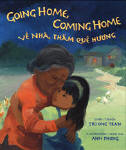
|
Going Home, Coming HomeBy Truong TranIllustrated by Ann Phong 2003, 31 pages, hardback, English & Vietnamese. A young girl visits her grandmother in Vietnam, where her parents were born, and learns that she can call two places home. Poet Truong Tran uses delicate, lyrical prose to craft this tender story of leaving and finding the places that make up who we are. Ann Phong's lush paintings complete this unforgettable journey with vibrant color and loving detail.
View Additional Information
|
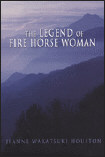
|
The Legend of Fire Horse WomanBy Jeanne Wakatsuki Houston2003, 304 pages, hardback. In Hiroshima, Japan, 1902, a woman born under the portentous Fire Horse Sign is married by proxy into the wealthy Matsubara family, and sent to join her new husband in a new world—America. In California, 1942, this same woman—facing the sunset of her life rather than the dawn—is sent to a Japanese internment camp with her daughter and granddaughter. This is Jeanne Wakatsuki Houston's, co-author of Farewell to Manzanar, first novel.
View Additional Information
|
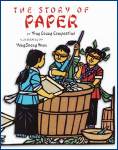
|
The Story of PaperBy Ying Chang CompestineIllustrated by YongSheng Xuan 2003, 30 pages, hardback. After the Kang brothers get in trouble at school, they devise a way to make paper, which will make things easier for both their teacher and themselves. Includes a historical note and a recipe for home-made paper.
View Additional Information
|
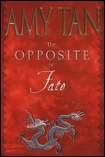
|
The Opposite of FateBy Amy Tan2003, 416 pages, hardback. These are musings on my life, including the metaphors I used as an eight-year-old child, sensing books as windows opening and illuminating my room, and the thoughts I had as I wrote my mother's obituary, trying to sum up who she was and what legacy she had bequeathed to me….
They are musings linked by my fascination with fate, both blind and blessed, and its many alternatives: choice, chance, luck, faith, forgiveness, forgetting, freedom of expression, the pursuit of happiness, the balm of love, a sturdy attitude, a strong will, a bevy of good-luck charms, adherence to rituals, appeasement through prayer, trolling for miracles, a plea to others to throw a lifeline, and the generous provision of that by strangers and loved ones.
View Additional Information
|
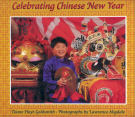
|
Celebrating Chinese New YearBy Diane Hoyt-GoldsmithPhotographs by Lawrence Migdale 1998, 32 pages, paperback. Follow the life of Ryan Leong and his family as they get ready for and celebrate the Lunar New Year in San Francisco. This is a wonderful introduction to Chinese culture as it relates to the celebrating of the Lunar New Year.
View Additional Information
|
Copyright © 2004 by Asian American Curriculum Project, Inc. (a non-profit organization since 1970)
Visit our website at AsianAmericanBooks.com
To unsubscribe simply reply to this email and type "REMOVE" in the subject line.